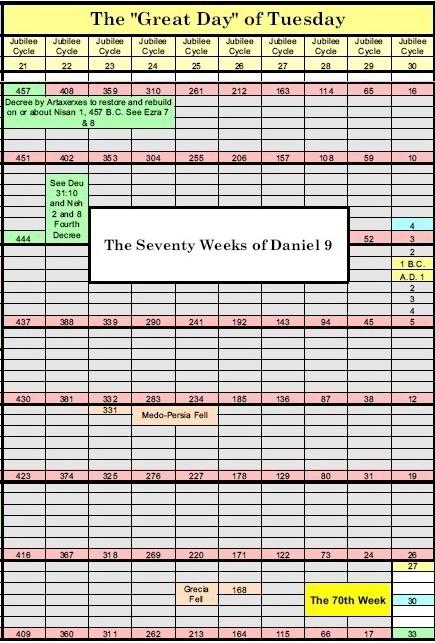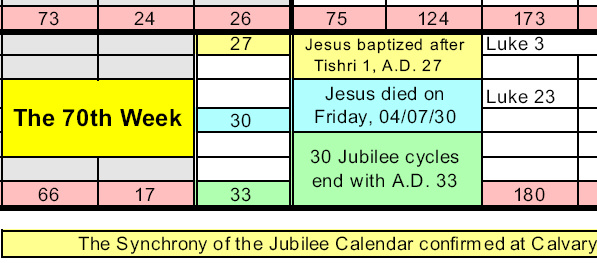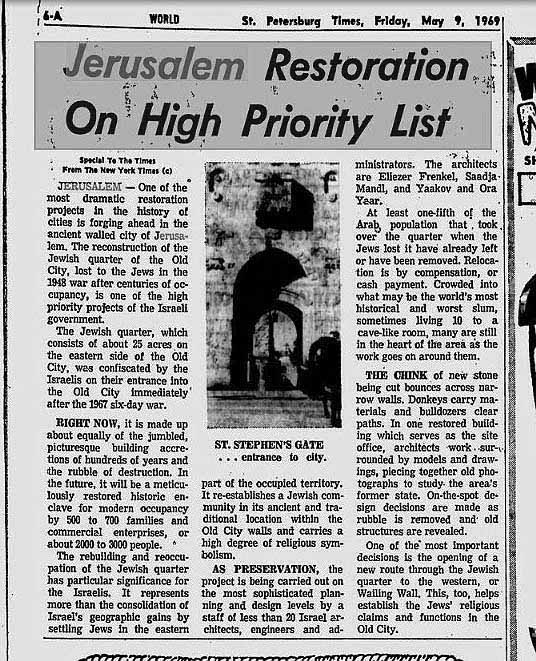Zao is life
Well-Known Member
I think the OP video people are right about a bunch of important things, but they are also wrong about some other very important things. One of the errors they make is how they address the 70th week, and another is how they count Jubilee cycles.
They count 2 1000 year "Days", as being 40 Jubilee cycles, or 2000 years. So he's going 40 Jubilees X 50 years = 2000 years. Only problem is they have to be counted just like in the original 70 week Prophecy where the 50th Jubilee year also became year #1 for the next Jubilee cycle. There were 3 sets of 70 weeks starting at the Exodus in 1437BC, to the end of Daniel 9's 70 weeks in 34AD.
I agree, except with where you have the completion of Daniel's seventy weeks. This is a subject that involves a lot of things, beginning with what the law says:
Whether the Jews always kept it this way or not, according to the Law the Jubilee year always began in the 49th year - on the Day of Atonement - and continued till half way through the following year, which was the first of the next cycle of 49 years:
Leviticus 25:8-10
"And thou shalt number seven sabbaths of years unto thee, seven times seven years; and the space of the seven sabbaths of years shall be unto thee forty and nine years. Then shalt thou cause the trumpet of the jubilee to sound on the tenth day of the seventh month, in the day of atonement shall ye make the trumpet sound throughout all your land. And ye shall hallow the fiftieth year, and proclaim liberty throughout all the land unto all the inhabitants thereof: it shall be a jubilee unto you; and ye shall return every man unto his possession, and ye shall return every man unto his family."
This was pointed out by the late Christian Gedge in his book "The Atonement Clock", which traces four cycles of 490 years, beginning with the night Jacob dreamed about the ladder between earth and heaven and ending with the date of Christ's crucifixion on April 7th, AD30 in the Gregorian calendar - which it turns out is the same day that modern astronomy traces the full moon of that year to:
Passover always coincides with the full moon, and between A.D 26 and A.D 36 (the years during which Pontius Pilate was governor of Judea), a full moon occurred on:
April 7th, A.D 30 | 15 Nisan (biblical calendar); and on
April 3rd, A.D 33 | 14 Nisan.
Nisan 15th was the first day of Unleavened Bread in A.D 30 (7 April A.D 30). Why is this important? It's important because of what is said both in the law and in the gospels:
Exodus 12:5-6 says,
"Your lamb must be perfect, a male, one year old; you may take it from the sheep or from the goats. You must care for it until the fourteenth day of this month, and then the whole community of Israel will kill it around sundown."
In Israel the next date begins at sundown, or immediately after sunset.
Leviticus 23:4-7 says,
"'These are the LORD's appointed times, holy assemblies, which you must proclaim at their appointed time. In the first month, on the fourteenth day of the month, at twilight, is a Passover offering to the LORD. Then on the fifteenth day of the same month will be the festival of unleavened bread to the LORD; seven days you must eat unleavened bread. On the first day there will be a holy assembly for you; you must not do any regular work."
Mark 14:12-13 tells us,
"And the first day of Unleavened Bread, when they killed the passover, His disciples said to Him, Where do You desire that we go and prepare that You may eat the passover? And He sent out two of His disciples and said to them, Go into the city, and there you shall meet a man bearing a pitcher of water. Follow him."
Matthew 26:17 tells us,
"And on the first day of the Feast of Unleavened Bread, the disciples came to Jesus, saying to Him, Where do You desire that we prepare for You to eat the Passover?"
The first day of Unleavened Bread is the 15th of Nisan (always). The Passover meal is eaten on the 15th of Nisan, after nightfall of the 14th, when it is slaughtered.
Luke 22:7-9 says,
"And the day of the Unleavened Bread came, when the Passover must be killed. He sent Peter and John, saying, Go and prepare the Passover for us, so that we may eat. 9 And they said to Him. Where do You desire that we prepare?"
Luke 22:1-2 says,
"And the Feast of Unleavened Bread, which is called the Passover, drew near. And the chief priests and scribes sought how they might kill Him."
John's gospel throws us off a little from the above, because John records,
John 19:14
"And it was the preparation of the passover, and about the sixth hour: and he saith unto the Jews, Behold your King!"
John 18:28
"Then led they Jesus from Caiaphas unto the hall of judgment: and it was early; and they themselves went not into the judgment hall, lest they should be defiled; but that they might eat the passover."
John 18:29-30 & 38-40:
"Then Pilate went out to them and said, What charge do you bring against this man? They answered and said to him, If he were not an evildoer, then we would not have delivered him up to you."
John 19:30-31
"When Jesus therefore had received the vinegar, he said, It is finished: and he bowed his head, and gave up the ghost. The Jews therefore, because it was the preparation, that the bodies should not remain upon the cross on the sabbath day, (for that sabbath day was an high day,) besought Pilate that their legs might be broken, and that they might be taken away."
John's gospel seems to imply that it was on the 14th of Nisan, because the first day of unleavened bread was a sabbath day - but if we follow what is said in the Law, and in Matthew, Mark, and Luke, and also by John where John 18:28 tells us that Jesus "was led from Caiaphas unto the hall of judgment: and it was early",
then we can only understand this to mean that Jesus was crucified on the 15th day of Nisan, the first day of unleavened bread, which was a sabbath day, and the reason why the Jews wanted the bodies to be taken off the cross, was because they WERE on the cross on the sabbath day. It was already too late for the Jews to attempt to ensure that the Romans did not crucify anyone on the sabbath day, so they besought Pilate to have the bodies taken down.
It's very involved, but both Christian Gedge's tracing of the schmita cycles in the scriptures and the four 490-years cycles beginning with the date of Jacob's ladder and ending with the date of the crucifixion, just happens to agree with modern astronomy's date of the first day of unleavened bread of 7 April, AD30 - 40 years before AD70.
Christian Gedge's book dates the last Jubilee year to have begun in the year Jesus began His ministry, which if true means that the idea that it was AD30, is faulty.
But if counted from AD30 (as the people in the OP video do), 40 Jubilee cycles from AD30 is 40 x 49 = 1,960 years - but if you add the 40 years between AD30 and AD70 during which the Jews were wandering in unbelief (Hebrews 3:9 & 17), then it brings you back to the year 2030 - though the Jews were not wandering in a literal wilderness in unbelief between AD30 and AD70, but they had the gospel being preached to them but lacked faith in the Word of God (Romans 9:32) .
IMHO the whole exercise of dating the year of the return of Christ always ends up too full of holes, no matter what model or whose model is followed - because there's always information we are missing but that is pertinent to a correct dating.
* As a disclaimer on his behalf I believe I should mention that the late Christian Gedge did NOT believe that the schimita cycles and counting continued beyond the crucifixion of Christ - he believed that the whole purpose for the biblical calendar and the cycles was what he called "The Atonement Clock" - which is the title of his book. He had a ministry called "Five loaves and two fishes" in New Zealand (in case the anyone wants to try and find the book and it may no longer be available anywhere). I did not know Chris Gedge - I'm just saying what I did know about him.
Last edited:












